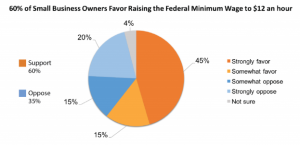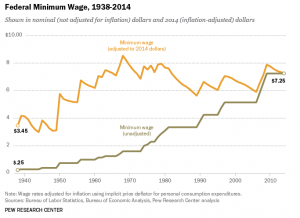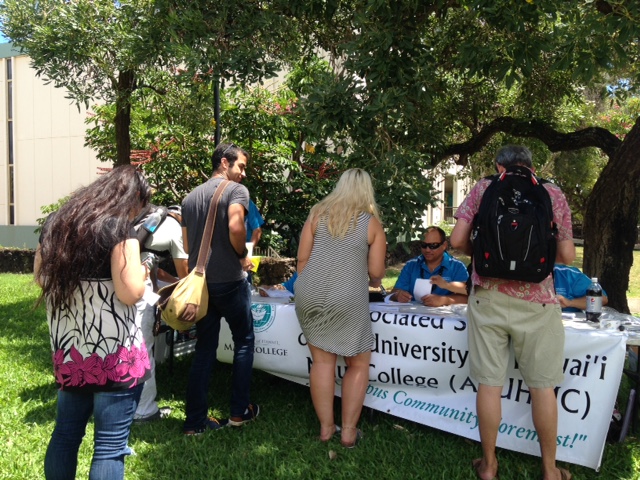Conservatives and economic professors can often be heard making claims that raising the minimum wage is a “job killer”. On a first impression this makes sense; if a company has to spend more money per laborer, it will need to reduce the number of labor workers to keep the financial output the same. Maybe because this widely used and regularly repeated assumption appears bona fide at the surface explains why there is a huge dearth of research to support any finding that raising the minimum has ever been a “job killer”. Contrary to popular folklore and the recent article in Ka Leo, “Hawai’i minimum wage raise will spell trouble” (Yashiki), the myth that raising the minimum wage is bad for job growth is based on, well, folklore.
The United States Department of Labor reports on the research of 600+ economists, 7 of which are Nobel Prize winners, stating “the weight of evidence now showing that increases in the minimum wage have had little or no negative effect on the employment of minimum-wage workers, even during times of weakness in the labor market.” The economists also state, “research suggests that a minimum-wage increase could have a small stimulative effect on the economy as low-wage workers spend their additional earnings, raising demand and job growth, and providing some help on the jobs front.”
To further examine this issue of raising the minimum wage, we’ll look at small businesses, large businesses, stagnation/ inflation, and possible solutions for Hawai’i.
Minimum Wage Increase for Small Business Owners
Small Business Majority, a national small business advocacy organization focusing on solving the biggest problems facing small businesses, conducted a survey on raising the minimum wage. The majority of the businesses had 1-5 employees; in addition, 3 out of 5 business owners responded in favor of an increase of the minimum wage to $12 an hour. The survey reports, “small businesses support increasing the minimum wage because it would immediately put more money in the pocket of low-wage workers who will then spend the money on things like housing, food, and gas. This boost in demand for goods and services will help stimulate the economy and help create opportunities.” Surprisingly, 52 percent of the small business owners in this survey identified as Republican while 40 percent as Democrat and 8 percent as pure independent.
 Further evidence that an increase in the minimum wage can be good for small businesses is reported by the United State Department of Labor, “research has shown that higher wages sharply reduce employee turnover which can reduce employment and training costs.”
Further evidence that an increase in the minimum wage can be good for small businesses is reported by the United State Department of Labor, “research has shown that higher wages sharply reduce employee turnover which can reduce employment and training costs.”
Minimum Wage and Large Businesses
Hawai’i has several large highly profitable businesses with a reputation for maintaining low wages including Walmart, McDonalds, Home Depot, TJMaxx, and Bank of America. Large companies have power in the number of employees they have and their ability to hold a community hostage when they threaten to fire staff if wages are increased. Worse yet, keeping the wages low for their employees results in the county or state providing for the lack of pay with tax revenue while the large corporation earns higher profits. The journal New Labor Forum reported, “…some of the largest companies in the world, such as Walmart, have a disproportionate number of workers on public assistance.” The United States Congress, House Democratic Staff of the Committee on Education and the Workforce, 2004 report found, “that one 200-person Walmart store may result in a cost to federal taxpayers of US$420,750 per year—about US$2,103 per employee.”
The difference between big businesses and small businesses is evident in a local economy. Small businesses are the No.1 area of growth in employment and generating money in the local economy; whereas, large businesses syphon the money out of local economies and have huge economic stratifications built into their structures between low paid workers to CEO. The New Labor Forum articulates it like this, “the bonuses handed to 165,200 executives by Wall Street banks in 2013—totaling $26.7 billion—would be enough to more than double the pay for all 1,085,000 Americans who work full-time at the current federal minimum wage of $7.25 per hour.”
To add insult to injury, while the state and county taxes provide low wage families with services for living, the state and county lose out on potential tax revenue from livable wages. If the wages are increased the county and state could collect more from income taxes while less people would be dependent on the county or state safety net services despite the fact of working a full time job.
Stagnation and Inflation
Another common economic statement often repeated by politicians and economic professors is that the wages for American workers have been stagnant. Unlike the myth that wage increases will cause job losses, the stagnation rhetoric is based on data and fact. The Economic Policy Institute (EPI), a nonprofit, nonpartisan think tank focused on the needs of low and middle-income workers in economic policy discussions, reported “Despite increasing economy-wide productivity, wages for the vast majority of American workers have either stagnated or declined since 1979, and this weak wage growth extends even to those with a college degree.”
Even more sobering is the statistic that the federal minimum wage peaked in 1968 when adjusted to 2014 dollars. We peaked 47 years ago, or three generations ago. 
This stagnation in wages hinders the buying power of employees ultimately limiting the economic potential of local businesses that would benefit from the flow of money in their community. To address the problem of stagnation, 12 states plus the District of Columbia annually increase their state minimum wage to account for the increase rise in the cost of living.
Possible Solutions for Hawai’i
There are no shortages of ideas being implemented by cities, counties, and states across America that are increasing the minimum wage for their residents to reflect a living wage. Hawai’i could adopt rent controls to protect their small businesses from being forced out of business. Hawai’i could also adopt a “low wage employer fee” that would tax large high profit businesses that pay low wages to compensate for the tax revenue being used to provide social services for their employees working full time.
Hawai’i is beginning to add incremental increases to its minimum wage to reflect a more livable wage. During this time Hawai’i residence and policy makers should avoid falling for over hyped fables of job losses to minimum wage increases and understand that a livable wage is good for Hawai’i. The United States Department of Labor states it clearly, “minimum wage increases have little to no negative effect on employment as shown in independent studies from economists across the country. Academic research also has shown that higher wages sharply reduce employee turnover which can reduce employment and training costs.”
You can read Ka Leo’s original article arguing against minimum wage here: Hawaii minimum wage raise will spell trouble.



